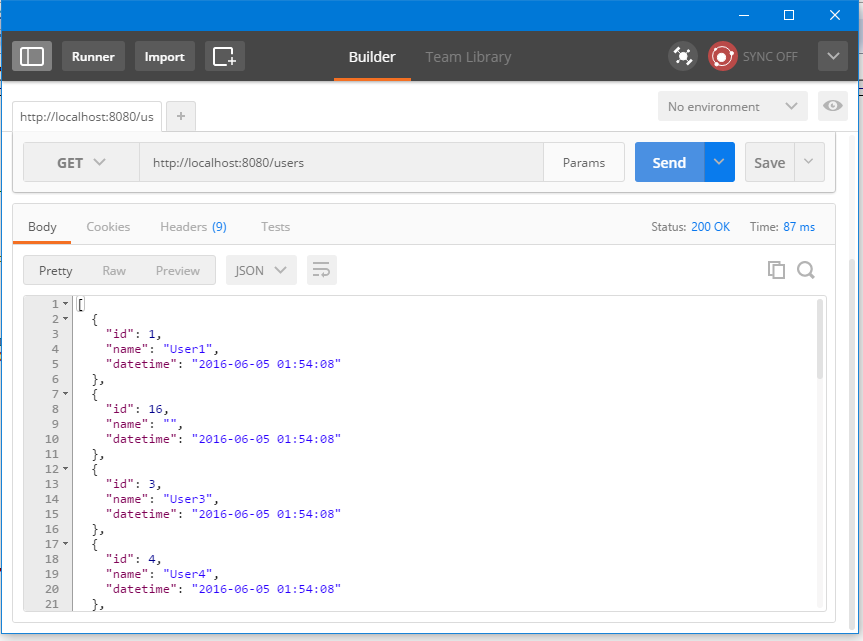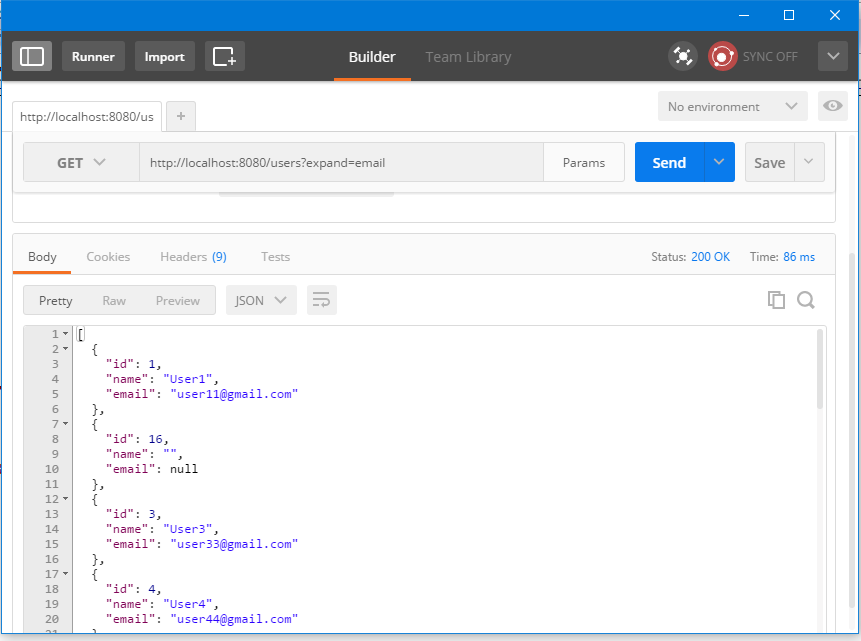通過覆蓋 fields() 和 extraFields() 方法,可以定義一些數據放入回應中。這兩種方法之間的差別在於,前者定義了默認設置的字段,包函在回應中;而後者如果最終用戶的請求通過擴展查詢參數,之後可以在回應包函附加字段。
第1步 - 修改 models/MyUser.php 並使用以下代碼:
<?php
namespace app\models;
use app\components\UppercaseBehavior;
use Yii;
/**
* This is the model class for table "user".
*@property integer $id
* @property string $name
* @property string $email
*/
class MyUser extends \yii\db\ActiveRecord {
public function fields() {
return [
'id',
'name',
//PHP callback
'datetime' => function($model) {
return date("Y-m-d H:i:s");
}
];
}
/**
* @inheritdoc
*/
public static function tableName() {
return 'user';
}
/**
* @inheritdoc
*/
public function rules() {
return [
[['name', 'email'], 'string', 'max' => 255]
];
}
/**
* @inheritdoc
*/
public function attributeLabels() {
return [
'id' => 'ID',
'name' => 'Name',
'email' => 'Email',
];
}
}
?>
除了默認的字段:id 和 name,這增加了一個自定義字段 - datetime。
第2步 - 在 Postman,運行通過URL :http://localhost:8080/users

第3步 - 現在,修改用戶模型:models/MyUser.php 並使用以下代碼:
<?php
namespace app\models;
use app\components\UppercaseBehavior;
use Yii;
/**
* This is the model class for table "user".
*
* @property integer $id
* @property string $name
* @property string $email
*/
class MyUser extends \yii\db\ActiveRecord {
public function fields() {
return [
'id',
'name',
];
}
public function extraFields() {
return ['email'];
}
/**
* @inheritdoc
*/
public static function tableName() {
return 'user';
}
/**
* @inheritdoc
*/
public function rules() {
return [
[['name', 'email'], 'string', 'max' => 255]
];
}
/**
* @inheritdoc
*/
public function attributeLabels() {
return [
'id' => 'ID',
'name' => 'Name',
'email' => 'Email',
];
}
}
?>
請注意,email 字段是由 extraFields()方法返回。
第4步 - 要獲取此字段的數據,運行:http://localhost:8080/users?expand=email 如下結果:

自定義操作
yii\rest\ActiveController 類提供了以下操作(動作) -
-
Index − 逐頁列出資源
-
View − 返回指定資源的詳細資訊
-
Create − 創建一個新的資源
-
Update − 更新一個已存在的資源
-
Delete − 刪除指定的資源
-
Options − 返回支持的HTTP方法
以上所有動作在 method() 方法中聲明。
要禁用 “delete” 和 “create” 的動作,修改 UserController.php 並使用以下代碼 -
<?php
namespace app\controllers;
use yii\rest\ActiveController;
class UserController extends ActiveController {
public $modelClass = 'app\models\MyUser';
public function actions() {
$actions = parent::actions();
// disable the "delete" and "create" actions
unset($actions['delete'], $actions['create']);
return $actions;
}
}
?>
錯誤處理
當獲得一個RESTful API請求,如果該請求錯誤或出現一些意想不到的東西在伺服器上發生,可以簡單地拋出一個異常。
如果能找出錯誤的原因,應該使用一個適當的 HTTP 狀態碼來拋出異常。
Yii REST 使用以下狀態 -
-
200 − OK/正常完成
-
201 − 一個資源成功創建用來回應POST請求。 Location頭包含一個指向新創建資源的URL。
-
204 − 請求被成功處理並回應但不包含內容
-
304 − 資源沒有被修改
-
400 − 錯誤的請求
-
401 − 驗證失敗
-
403 − 通過身份驗證的用戶不允許訪問指定的API端點
-
404 − 資源不存在
-
405 − 不被允許的方法
-
415 − 不支持的媒體類型
-
422 − 數據驗證失敗
-
429 − 過多的請求
-
500 − 內部伺服器錯誤
上一篇:
Yii動作使用RESTful API
下一篇:
Yii測試
